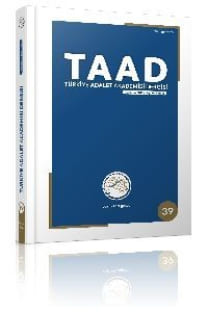ULUSLARARASI YATIRIM TAHKİMİNDE DEVLET LEHİNE MANEVİ TAZMİNATA İLİŞKİN DÜŞÜNCELER
Uluslararası yatırım tahkimi, manevi tazminat, sürecin suistimali, ICSID, ISDS
International investment law, moral damages, abuse of process, ICSID, ISDS,
___
- Andrea Bjorklund, The Role of Counterclaims in Rebalancing Investment Law (2013) 17(2) Lewis & Clark Law Review 461
- Anthony Sinclair, Louise Fischer & Sarah Macrory, ICSID Arbitration: How long does it take? 4 Global Arb. Rev., (26 October 2009)
- Bernd Ehle & Martin Dawidowicz, ‘Chapter 10: Moral Damages in Investment Arbitration, Commercial Arbitration and WTO Litigation’, in Jorge A. Huerta-Goldman , Antoine Romanetti , et al. (eds), WTO Litigation, Investment Arbitration, and Commercial Arbitration, Global Trade Law Series, Volume 43 (Kluwer Law International 2013)
- Borzu Sabahi, Chapter 6: Supplemental Compensation’ in ‘Compensation and Restitution in Investor-State Arbitration: Principles and Practice [Oxford Scholarly Authorities on International Law (OUP 2011)]
- Emmanuel Gaillard, Abuse of Process in International Arbitration, ICSID Review (2017)
- Kyriaki Karadelis and Alison Ross, EDF Faces ICC Claim Over German Power Company Purchase, Global Arbitration Review (6 June 2012)
- Matthew T. Parish, Annalise K. Newlson & Charles B. Rosenberg, Awarding Moral Damages to Respondent States in Investment Arbitration, 29 Berkeley J. Int’l L. 225, (2011)
- Marc Allepuz, Moral Damages in International Investment Arbitration, Spain Arbitration Review | Revista del Club Español del Arbitraje, (© Club Español del Arbitraje; Wolters Kluwer España 2013, Volume 2013 Issue 17)
- Melissa Ordonez, States’ counterclaims: how hard is it to counterattack in international investment arbitration? Int. A.L.R. 2019, 22(1), 27-45, 2019.
- Patrick Dumberry, Compensation for Moral Damages in Investor-State Arbitration Disputes, Journal of International Arbitration, (© Kluwer Law International; Kluwer Law International 2010, Volume 27 Issue 3)
- Patrick Dumberry, Satisfaction as a Form of Reparation for Moral Damages Suffered by Investors and Respondent States in Investor-State Arbitration Disputes, 3 J. Int. Disp. Settlement 199 (2012)
- Pierre Lalive and Laura Halonen, On the Availability of Counterclaims in Investment Treaty Arbitration, (2011) 2 Czech Yearbook of International Law 146.
- Stephan Wittich, Non-Material Damage and Monetary Reparation in International Law, 15 Finnish Y.B. Int’l L. (2004)
- Subhiksh Vasudev, Damages for Non-Material Harm in Investment Treaty Arbitratio’, in Matthias Scherer (ed), ASA Bulletin, (© Association Suisse de l’Arbitrage; Kluwer Law International 2019, Volume 37 Issue 1)
- Todd Allee & Clint Peinhardt, Contingent Credibility: The Reputational Effects of Investment Treaty Disputes on Foreign Direct Investment 17-18 (25 September 2008)
- Yaraslau Kryvoi, Counterclaims in Investor-State Arbitration, 21 Minn. J. Int’l L. 216 (2012)
- Biwater Gauff (Tanzania) Ltd. v. Tanzania, ICSID Case No. ARB/05/22, Gary Born’s Concurring and Dissenting Opinion, 18 July 2008.
- Cementownia “NowaHuta” S.A. v. Republic of Turkey, ICSID Case No. ARB(AF)/06/2, Award, 17 September 2009
- Desert Line Projects L.L.C. v. Yemen, ICSID Case No. ARB/05/17, Award, 6 February 2008.
- Europe Cement Investment & Trade v. Republic of Turkey, ICSID Case No. ARB/07/2, Award, 13 August 2009.
- Lundin Tunisia B. V. v. Republic of Tunisia, ICSID Case No. ARB/12/30, Award, 22 December 2015
- Lusitania Cases, United States–Germany Mixed Claims Commission, 1 November 1923, Volume VII, U.N.R.I.A.A.
- ISSN: 1309-6826
- Yayın Aralığı: 4
- Başlangıç: 2010
- Yayıncı: Türkiye Adalet Akademisi
YARGITAY KARARI İNCELEMESİ: KAMBİYO SENETLERİNDE KORKUTMA DEF’İ VE CEBİR
ADİ KONKORDATO TALEBİNDEN FERAGAT
YABANCILIK UNSURU İÇEREN RESMÎ VASİYETNAMELERE UYGULANACAK HUKUK
BÖLGE ADLİYE MAHKEMELERİNİN TUTUKLAMA KARARI VERME YETKİSİ
Meltem İNELİ CİĞER, Mehmet Ali KÜÇÜKÇAVUŞ
UNUTULMA HAKKININ ORTAYA ÇIKIŞ SERÜVENİ VE KAPSAMININ DEĞERLENDİRİLMESİ
